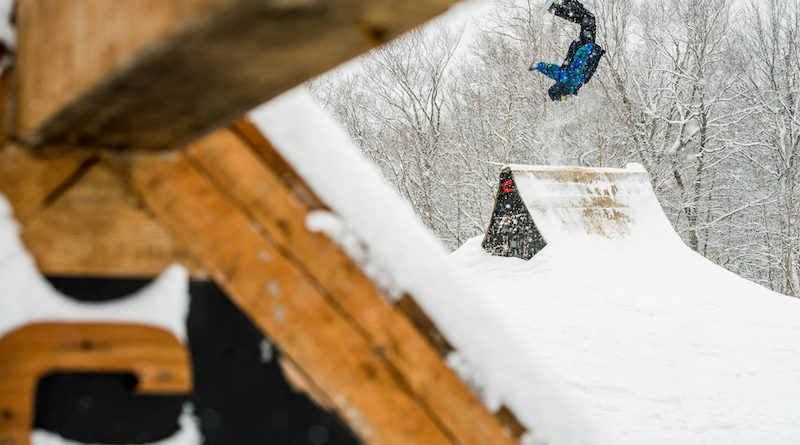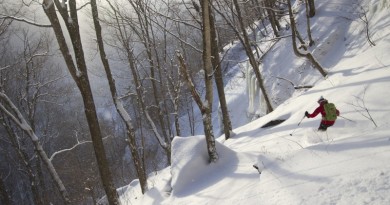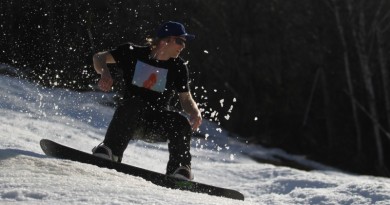Why Vail Is Buying Mount Snow and 16 Other Ski Areas
On Monday morning, July 22, Vail Resorts announced plans to acquire Peak Resorts, another ski industry giant. The move adds Mount Snow and 16 other ski areas to the behemoth’s portfolio, bringing the total to 34 resorts.
Early this morning, July 22, Vail Resorts, announced plans to acquire 100 percent of the outstanding stock of another giant in the American ski industry: Peak Resorts.
“We are incredibly excited to have the opportunity to add such a powerful network of ski areas to our Company,” said Rob Katz, chairman and chief executive officer of Vail Resorts. “Peak Resorts’ ski areas in the Northeast are a perfect complement to our existing resorts and together will provide a very compelling offering to our guests in New York and Boston.”
[ See related: What’s Next for Vermont’s Ski Resorts? and By the Numbers; Mount Snow Went Epic, Here’s What You Should Know ]
Peak Resorts, owner of Mount Snow in southern Vermont, Hunter Mountain in New York and operator of 14 other ski areas that cater to a largely urban audience is the only other publicly held ski company in the American market. When the deal closes sometime in 2019-2020, Vail Resorts will add Peak’s 17 ski areas to its existing network of 17 resorts and three urban ski areas.
This means that in addition to Vail Resorts’ Vermont ski areas—Stowe and Okemo— and Mt. Sunapee in New Hampshire, the Epic Pass will now be valid at Mount Snow, Vermont and Attitash, Wildcat and Crotched Mountain in New Hampshire.
The acquisition comes after a growth spurt for Peak Resorts. In recent years, the Sackler family, owner of Purdue Pharma, the makers of OxyContin and other drugs, had become the largest shareholder in Peak Resorts as first reported in the Deerfield Valley News. In the fall of 2015, Mount Snow acquired Hunter Mountain, New York, one of the East’s largest ski areas in terms of skier days and a popular destination for metro New York area skiers, for over $35 million. This past September, 2019, Peak added Snow Time, a collection of three Pennsylvania resorts (Liberty Mountain, Roundtop Mountain Resort, Whitetail) for $76 million.
According to a press release issued by Vail Resorts this morning, the ski industry mammoth has entered into a definitive merger agreement to acquire 100 percent of the outstanding stock of Peak Resorts, Inc. (NASDAQ: SKIS) at a purchase price of $11.00 per share. Shares in Peak Resorts closed slightly over $5 on Friday, July 19 and nearly doubled in morning trading today. The final deal is subject to regulatory review and Peak Resorts’ shareholder approval.
The aggregate purchase price for all Peak Resorts common stock is estimated to be approximately $264 million. Vail Resorts told shareholders Monday it plans to finance the acquisition through “a combination of cash on hand, its existing revolver facility and an expansion of its existing credit facility.”
In addition, Vail Resorts will be assuming or refinancing Peak Resorts’ outstanding debt.
Come the fiscal year ending in July 2021, Vail Resorts expects to enjoy approximately $60 million in incremental annual EBITDA from the acquisition, with additional revenue in future years across Vail Resorts’ network of resorts from “cost reductions from the elimination of certain duplicative administrative functions and greater efficiencies brought by Vail Resorts’ size and scale.”
However, Vail Resorts announced in a statement Monday that, “Upon closing, Vail Resorts plans to retain the vast majority of each resorts’ employees.”
In total, Vail Resorts says it expects the acquisition to increase its annual capital expenditures by $10 million. The added cost will be from what is required to operate Peak Resorts’ properties.
Upon closing, Vail Resorts plans to begin investing approximately $15 million over the next two years in one-time capital spending to “elevate guest experience” across the newly acquired Peak resorts.
The 2019-2020 Epic Pass, Epic Local Pass and Military Epic Pass will include unlimited and unrestricted access to the 17 Peak Resorts ski areas. Those with an Epic Day Pass will also be able to access the new ski areas as part of the total number of days purchased.
For the 2019-2010 season, Vail Resorts will honor and continue to sell all Peak Resorts’ pass products and Peak Resorts’ pass holders will have the option to upgrade their season passes to an Epic Pass or Epic Local Pass once the transaction closes.
The transaction has been approved by both companies’ boards of directors and the Peak Resorts board of directors has recommended that Peaks Resorts shareholders approve the transaction, which is expected to close in Fall 2019.
An Industry Pioneer
Peak Resorts has made big financial investments in its properties in recent years. In 2015, it acquired Hunter Mountain in 2015 for $36.8 million. In January 2019, the company announced it had completed $31 million in capital projects at Mount Snow and Hunter Mountain, including a brand new $22 million, 42,000 square foot Carinthia Base Lodge at Mount Snow and massive snowmaking improvements.
At Hunter Mountain, the company facilitated the largest terrain expansion at an East Coast ski resort in 15 years when it completed the Hunter North expansion on Christmas Eve, 2018. The expansion took eight months to complete and included five newly-cut trails and four new gladed ski areas on a previously undeveloped portion of the mountain, making for an 80-acre or 33% expansion of the Catskill ski area’s terrain.
Further, Peak Resorts, Inc. acquired three additional resorts in September 2018, with its acquisition of the privately-held company Snow Time, Inc. Snow Time previously owned and operated Liberty Mountain Resort, Whitetail Resort and Roundtop Mountain Resort, three destinations, all within driving distance of Washington, D.C. and Baltimore, M.D.
“With this acquisition, we are also able to make a much stronger connection to guests in critical cities in the Mid-Atlantic and Midwest and build on the success we have already seen with our strategy in Chicago, Minneapolis and De
Founded in 1977, Peak Resorts, Inc. made its first foray into the ski industry in 1981, when founder Tim Boyd bought a struggling 9-hole golf course outside of St. Louis called Hidden Valley and converted it into a ski area. Today, the Missouri-based company owns Mount Snow and 16 other resorts across the Midwest and East Coast. It is one of two publicly-traded ski resort companies and was one of the first companies (if not the first) to actively pursue what are commonly referred to as “feeder” resorts in the industry.
Instead of competing with larger companies for the largest, most glamorous and well-known ski areas in North America, Peak Resorts Inc. built a network of ski areas within close proximity of major American cities. Once it had built a base of loyal customers, it expanded north with acquisitions such as Mount Snow in 2007 and Attitash in New Hampshire the same year.
In a 2018 interview with Vermont Ski + Ride, Peak Resorts Vice President of Operations Jesse Boyd said that strategy was a calculated business move.
“We got started in the business running small metropolitan ski areas and transitioned to running medium and large resorts [such as Mount Snow and Attitash] and use those small metro resorts as a

feeder system,” said Boyd.
The majority of Peak Resorts, Inc.’s 17 ski areas are located within a one-hundred-mile radius of New York, Boston, Philadelphia, Cleveland or St. Louis.
For more about how Vail Resorts has used a similar model to build its customer base and bolster Epic Pass sales, see “Epic v.s. Ikon: The Pass Wars.”
As recently as last fall, Boyd reported the company was weathering a long string of consolidation within the ski industry well.
“The consolidation stuff hasn’t had a lot of effect on us,” he told Vermont Ski + Ride in August, 2018, explaining that Peak Resorts was targeting a different market than Vail Resorts and Alterra Mountain Company, which also owns 14 major ski resorts and offers the Ikon Pass.
Vail Resorts seems to have agreed.
For more about how consolidation in the national ski industry is playing out in Vermont, see “In the Race to Buy Ski Areas, Who Wins?”
Once the acquisition closes, Vail Resorts will own three ski areas in Vermont: Stowe Mountain Resort, Okemo Mountain Resort and now Mount Snow.
Featured Photo Caption: A rider hits one of Carinthia’s skate-inspired ramps. Photo by Mike Dawsy





Pingback: 6 Amazing Events for Late July – VT SKI + RIDE
Pingback: In the Race to Buy Ski Areas, Who Wins? – VT SKI + RIDE
This is a typical consolidation of all industries as they grow.
The winners benefit from greater economies of scale in administration and purchasing and advertising plus other marketing benefits plus the financial benefits of owning ski resorts which guarantees that there will be good snow weather in at least part of their resorts, and additional marketing benefits of greater brand recognition and the ability to offer tickets and other customer benefits across their entire system of ski and summer resorts. Sieg
Disappointing to see the continued conglomeration of ski resorts under a couple umbrellas. I have already seen changes at my favorite resorts that are not good. I used to enjoy the MAX Pass. It is gone. The remaining mega passes just don’t give me what I need. Instead, I got a season pass at one of my favorite local resorts. I will enjoy skiing there until it too is gobbled up.
As a long time season pass holder primarily skiing Attitash Mountain in NH, I, and I am sure that many more season pass holders are thrilled to see our mountain hopefully no longer owned by Peak Resorts. Peak Resorts main accomplishment at the owner of Attitash has been to invest as little as possible into maintainng and up grading Attitash. They have simply let it deteriorate and have been running it into extinction. Peak Resortshave treated Attitash season pass holders and all who ski there poorly, with little respect and thanks for skiing our mountain, and with no regard to providing an acceptable skiing experience. As an example, there is a single archaic triple chair to the summit of Attitash Mountain which has access to some of the steepest and best terrain in Mt. Washington Valley, which has out lived it’s useful life and for the last few years has continue to periodically break down. Finally, this past season, it broke down for the majority of the Christmas vacation week and then was fully down the entire second half of the ski season. Thus, with all the snow that fell this winter,m in NH, all the outstanding terrain on upper Attitash Mtn. Was not available to skiers most of this past ski seadon. Many day trippers were not made aware of this fact when they purchased their full price day ticket at the ticket windows
.
I ski Attitash because of the people that I ski with for years and the steep, challenging terrain available at Attitash. I hesitated buying a season pass for next season. I realized that no other nearby area provided me with the ski experience that Attitash does. I finally decided to renew my season pass at Attitash for next year. However, I, also, decided that if I did not see major improvements in how myself and other skiers are treated, improvement in management, operations, lifts, and facilities, next ski season and there was any repeat of the problems that plagued Attitash last Attitash, this was going to be my final season skiing at Attitash!
WELCOME VAIL!!!! We all look forward to your company investing in and returning the ski experience at Attitash as it had it had been for so many years past – the best skiing in the valley and beyond!
PEAK RESORTS, to use a well known phrase,
DON’T LET THE DOOR HIT YOU ON THE WAY OUT!
I am sure my comments speak for many other skiers that have regularly skied Attitash while it was under Peak Resorts stewardship!
Pingback: Epic v.s. Ikon: How the Pass Wars Began – VT SKI + RIDE
Pingback: Hermitage Club Assets Go on the Block – VT SKI + RIDE
Since Vail is a publicly traded stock, I’m surprised no one has mentioned what’s inside their public 10K disclosures, staring you right in the face. Vail is managed by very smart folks. While industry consolidation and market segmentation are key, so is the weather. In the 10K a strategy of spreading their eggs all around the country is described. Partly for economic reasons but also because of the unpredictable weather in the United Stated. They argue that geographic dispersal will help to even out revenue variability from year to year. Since they are publicly held, it’s all about profitability as a whole. It won’t surprise me either that Vail disposes of certain ski areas when they don’t measure up to the benchmark.